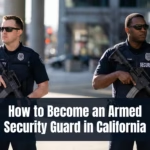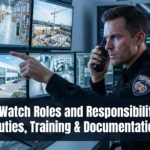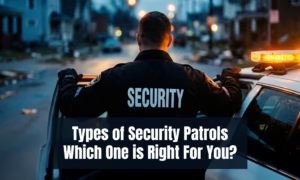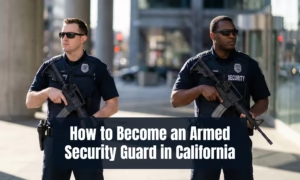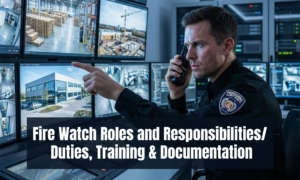With 6.53 million offences committed in 2021, property crime was the most common type of crime in the USA. During the same year, 2.55 million violent crimes were committed, including 2.3 million assaults.
The rising incidence of crime is a cause for serious concern. It is, therefore, tremendously crucial to implement safety measures to prevent mishappenings such as theft, harassment, murder, and accidents.
In this regard, one of the critical duties of security professionals is patrolling. You might be wondering what is patrol and how it can help in security.
Let’s first define patrol and understand what is patrolling in security before going into the depth of security patrolling, the services of a patrol security guard, and the types of patrol.
Patrolling in security means keeping an eye on or watching over an area by regularly walking or travelling around it. In other words, patrolling is taking periodic rounds and looking for any suspicious activity to prevent mishappenings.
For example, security guards play a crucial role in maintaining the safety and security of various properties, including banks and private residences. They are responsible for keeping a watchful eye on the premises, monitoring any signs of suspicious activity, and preventing unauthorized individuals from entering the area.
Proper and regular inspections allow guards and other security officers to ensure the protection of the allotted area smoothly and effectively.
What is Patrolling in Security- Purpose?
Security patrolling involves regular monitoring ensuring a feeling of safety and comfort and results in the protection of lives and assets.
It is of utmost importance to residentials, businesses, communities and the protection of high-profile people or places. As it involves looking for signs of suspicious activity and responding to any incidents or emergencies that may occur.
The following are the most apparent benefits of having guards conduct security patrols of a specific area:
Crime Prevention:
Majorly security professionals perform crime prevention through proactive patrols for residents, businesses, and communities. Proactive patrol means stopping a crime before it actually happens.
The objective can be achieved by:
- Actively monitoring the house for any signs of suspicious or criminal activity
- Looking for individuals who may be loitering or attempting to gain unauthorized access to a site or building
- Establishing emergency procedures in case of larceny
- Working with law enforcement to identify potential threats to businesses
- Building relationships and trust with the community by maintaining a visible presence and offering education and training on identifying and reporting suspicious activity.
These efforts help to deter criminal activity and maintain a safe and secure environment.
Detection and Response:
Security patrolling is an ideal way to detect and prevent possible security threats and problems. Patrolling can be conducted on foot, in vehicles, or by using security technology such as cameras and sensors.
Implementing an effective and immediate patrolling system can achieve an agile response in the event of an incident or event.
One can easily enjoy vacations without worrying about the safety of his home. This is because security staff can swiftly respond to alarms because the area is regularly patrolled.
Additionally, an immediate action protocol can be initiated from a remote patrol control connected to an ACR (Alarm Receiving Center) in case of break-ins, theft, or vandalism.
Maintenance of Order:
With an inspector patrolling the streets, shouldn’t there be fewer chances of breaking the law?
Officers patrolling for security purposes are a great rescue from traffic signal accidents to severe criminal activities.
A visible security patrol presence can deter criminal activity, as potential perpetrators may be less likely to engage in illegal behaviour if they believe they will be caught.
Gathering Information:
By observing and reporting on criminal activity, security patrols can provide valuable information that can be used to improve security measures and target enforcement efforts.
Security patrols can also observe and report on criminal activities and suspicious behaviour, such as drug dealing, theft, or gang activity.
The gathered information can be used by law enforcement to build intelligence profiles on criminal organizations, track patterns of criminal behaviour, and identify the individuals involved in these activities.
In addition, security patrols can provide valuable information about the security features of buildings, parks, and other public spaces. They can identify areas where security measures are lacking and make recommendations for improvement, such as installing security cameras or adding more lighting.
Responding to Alarms:
Whether it’s contacting law enforcement, conducting further investigation, or intervening to prevent an incident from escalating responding to alarms is the key.
When alarms are triggered, patrols can be dispatched to investigate the cause and take appropriate action to address the situation.
Security personnel can help mitigate potential damage or harm by patrolling and responding to alarms and ensure a safe and secure environment.
Responding to Calls for Service:
Patrol guards also respond to public service calls, particularly for non-emergency issues.
For instance, residents, businesses, or other individuals may contact the security company to report incidents such as noise complaints, loitering, or other non-emergency issues that require assistance.
In such cases, patrols can be dispatched to the location to investigate the situation, assess the severity of the issue, and take appropriate action to address the concern.
This may include informing the individuals involved about the complaint and asking them to disperse, providing information or resources to help resolve the issue, or escalating the matter to law enforcement or other authorities if necessary.
Traffic Control:
Do you possibly look out for security professionals or cameras before you even think to break the traffic signal?
Patrols dressed in uniforms, marked cars, and even security cameras are easily visible from a distance. The sense of warning, therefore, prevents the public to abide by the traffic rules and allows the traffic to flow smoothly.
Having dedicated patrols or devices responsible for ensuring safety and security in an area, through actively engaging with potential threats, strengthens traffic control and acts as a discouragement to criminal behaviour.
Protection of Property:
Patrol security ensures the protection of property through various action plans. Regular monitoring conducted on foot, vehicle, or security technology such as cameras and sensors allows patrols to detect threats easily.
Undoubtedly, visible security presence makes it more difficult for potential perpetrators to carry out illegal actions without being detected.
Patrols can also respond quickly to any security incidents that may occur, such as break-ins or property damage, and take appropriate action to mitigate potential harm and protect the property.
They can include access control, such as using gates or fencing to limit access to the property and conducting security assessments to identify potential vulnerabilities and address them proactively.
Public Relations:
For effective security patrolling, it’s essential for security personnel to balance their enforcement duties with maintaining positive public relations.
Patrolling officers should make an effort to be approachable and friendly and to communicate with the public respectfully and professionally.
This means engaging with residents, business owners, and other stakeholders to understand their concerns and needs.
Community outreach programs can be a valuable tool for improving public relations. For example, events such as neighbourhood meetings, crime prevention seminars, and community policing initiatives.
To build trust with the public, patrols should be transparent about their activities and communicate regularly with the community about their work by providing information about crime trends, response times, and other relevant data.
Emergency Response:
Patrolling officers are often the first responders in emergencies and can assist until other emergency services arrive.
Security guards are well-trained and equipped with the necessary tools and communication devices that can quickly respond to emergencies, such as fires, natural disasters, and medical emergencies.
In addition to providing a first line of defence, security patrolling can also help to coordinate with first responders, such as police and fire departments, and assist in the evacuation and triage of affected individuals.
Overall, security patrolling is an important component of emergency preparedness and response, helping to ensure the safety and well-being of both the public and private sectors.
Patrolling Types And Their Benefits
Foot patrol
Foot patrol is the most common type of patrolling. They are conducted on foot, and officers move through an area, checking for security incidents.
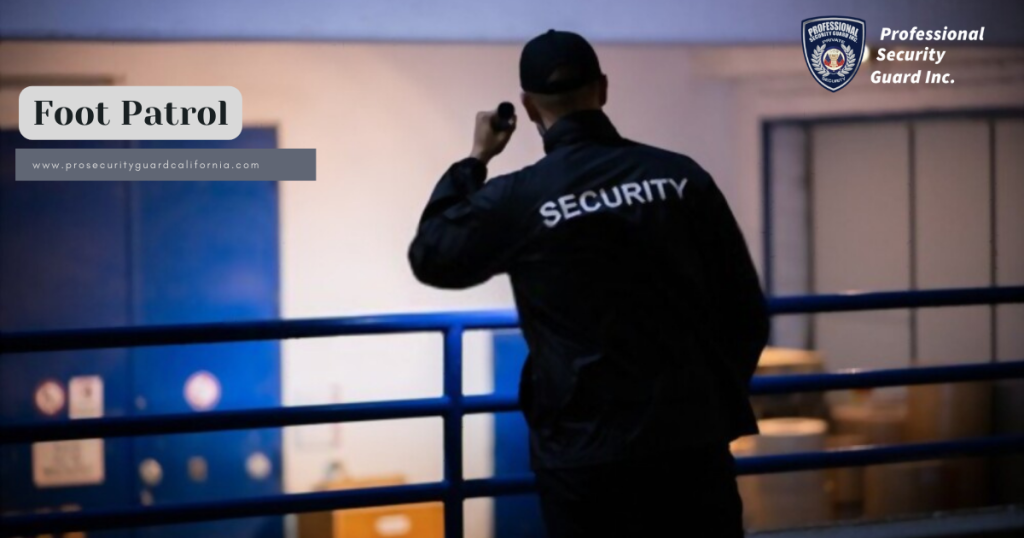
Advantages of Foot Patrol:
- Allows officers to be more visible and approachable
- Provides officers with a better understanding of the area they are patrolling
- Can be more effective in detecting and deterring criminal activities in certain areas
When to use Foot Patrol:
- In areas where vehicles cannot access such as narrow alleys, stairs, and other restricted areas
- In areas where a visible security presence is needed, such as in residential areas, shopping malls, and public parks
Vehicle Patrol
Vehicle patrols are conducted using vehicles, and officers move through an area, checking for security incidents.
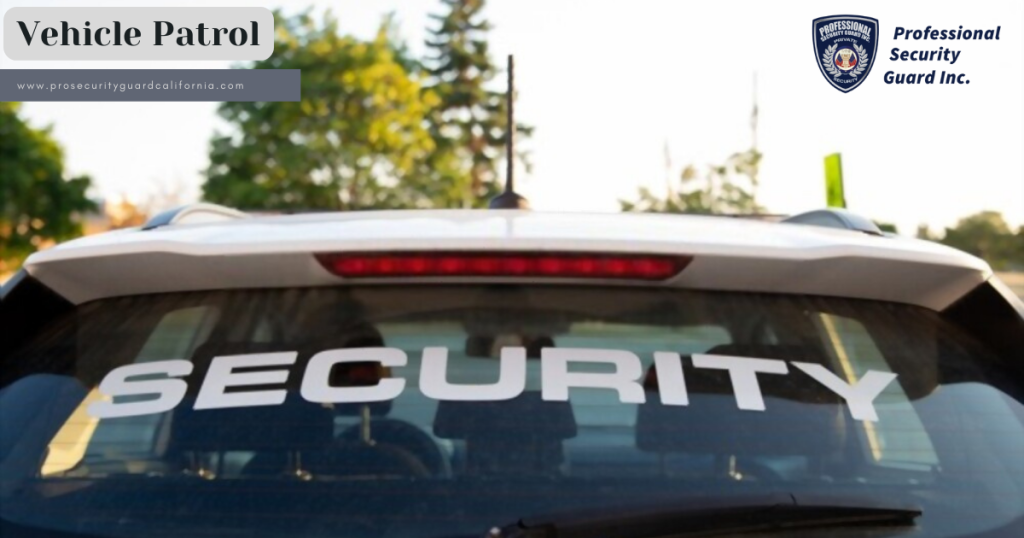
Advantages of Vehicle Patrol:
- Allows officers to cover larger areas quickly.
- Can be more effective in responding to security incidents that require a quick response time.
- Provides officers with a higher degree of safety and mobility.
When to Use Vehicle Patrol:
- In larger areas, such as industrial parks, business districts, or college campuses, a lot of ground needs to be covered quickly.
- In areas where a quick response time is critical, such as in high-crime areas or during major events.
Electronic Patrol
Electronic patrols use technology, such as CCTV cameras and GPS tracking, to monitor an area for security incidents. Officers can monitor the area remotely and respond when needed.
Advantages of Electronic Patrol:
- Allows for 24/7 monitoring of an area.
- Can cover a large area with minimal staff.
- Can provide real-time information about security incidents.
When to use Electronic Patrol:
- In areas where 24/7 monitoring is needed, such as in warehouses, data centres, and critical infrastructure.
- In areas that are difficult or dangerous for officers to patrol in person, such as hazardous materials storage areas, nuclear power plants, or mines.
Every patrol type has its unique advantages & knowing the types of security patrols allows you to pick the one that fits your requirements.
How to Conduct Patrolling in the Most Effective Way
By following these steps, officers can ensure that they cover all necessary areas and respond effectively to any security incidents that may occur.
Planning and Preparation
Identifying the Areas to Be Patrolled:
Before starting a patrol, officers should plan and prepare to ensure that they cover all necessary areas by identifying the areas to be patrolled, such as specific buildings, streets, or neighbourhoods.
For example, to protect a construction site patrols will identify the locations of key areas, such as entry and exit points, equipment storage areas, access points to check all materials, fire watch, and hazardous materials storage areas.
Establishing Patrol Routes:
Once the areas have been identified, officers should establish patrol routes that cover those areas efficiently. This could involve breaking up the area into smaller zones and assigning specific officers to each zone.
Creating a patrol Checklist
Creating a checklist ensures officers don’t miss any important tasks or responsibilities during patrol.
The checklist should include all necessary activities, such as:
- A thorough inspection of the premises. For example, parking lot, building exterior, exits and entrances of office buildings
- Checking doors and windows for signs of damage such as broken windows or forced entry
- Monitoring surveillance systems such as CCTV cameras of residents and buildings
- Responding to alarms. For example, taking quick action in the event of an emergency, such as a fire or medical situation that occurs suddenly in a business event.
- Reporting any violations of company policies or safety regulations.
Communication and Coordination
With Other Officers
Effective communication and coordination are critical components of patrolling.
Patrols should communicate with other officers to ensure that everyone is aware of what is happening in the area. This could involve regular briefings with other officers, sharing information about incidents that have occurred, and coordinating response efforts.
With Other Agencies
When working with other agencies, such as local law enforcement or emergency services, officers should ensure that they are familiar with the agency’s protocols and procedures.
They should also coordinate their efforts with these agencies to ensure a smooth response to any incidents that occur.
Use of Technology
CCTV Cameras
CCTV cameras can be used to monitor areas remotely and identify potential security incidents.
GPS Tracking
can help officers locate and respond to incidents quickly, while communication devices can ensure that officers can stay in touch with each other and with other agencies.
Communication Device
Communication devices can ensure that officers can stay in touch with each other and with other officers and agencies.
Who Needs Patrolling?
Businesses:
FBI crime statistics indicate there is a burglary every 12 seconds in the United States, resulting in a loss of $3.4 billion in property and personal possessions.
Businesses like retail stores especially those that sell high-value items like electronics, jewellery, or designer clothing, may be at higher risk for theft or burglary.
On the other hand, manufacturing facilities may have large amounts of valuable raw materials or finished products, making them targets for theft. Security guard patrol services can help deter potential thieves and catch any incidents of theft or vandalism.
Similarly, banks and other financial institutions are at great risk of robbery and other security breaches. Security patrolling can help deter criminal activity and ensure the safety of employees and customers.
Entertainment venues such as theatres, stadiums, and concert halls may have large crowds and high-profile events, making them potential targets for terrorism or other threats. Security patrolling can help ensure the safety of attendees and prevent any incidents.
Overall, any business or property with valuable assets, high foot traffic, or potential security risks may benefit from security patrolling.
Government Buildings:
Government buildings usually contain valuable assets and highly sensitive information. Assuring the safety of these assets and information is a significant responsibility.
Creating and implementing a sophisticated security solution is mandatory to prevent any threats. Those who plan to do something illegal within the facility can be extremely discouraged by the presence of patrolling security guards.
In occasions like money transfers and transportation of other valuable assets, it is necessary to have the right security precautions in place.
Furthermore, when it comes to managing other security measures like fire alarms, electronic security surveillance equipment, and CCTV systems, they can be immensely helpful.
Residential Communities
Who doesn’t want to make their residents a safe place to live in?
Residential communities desperately need security guards who can:
- Look for miscreants who are loitering or have bad intentions
- Take immediate action in case of any mishappening
- Give them protection and comfort
- Keep an eye on the surveillance cameras to check for any sort of doubtful activity
- Take corrective action in case of damage to the property or any other loss
Final Thoughts
The above article answered “What is patrolling in security” in depth and highlighted how security patrols can successfully contribute to a safer and more secure environment for everyone.
Effective patrolling helps in the evaluation of the overall security condition of an area or property and ultimately leads to a reduction in crime rates.
However, it is imperative for security personnel to acknowledge their role as public servants and prioritize the needs and safety of the community while being accountable for their actions and decisions.


